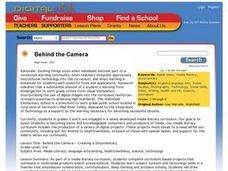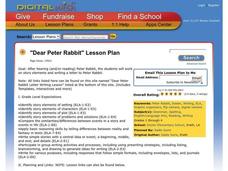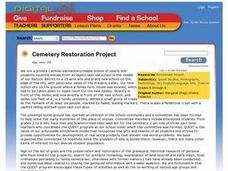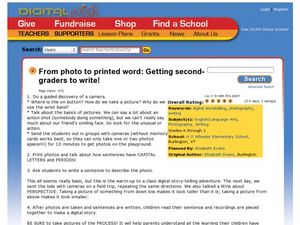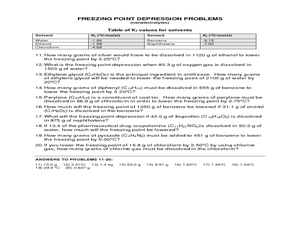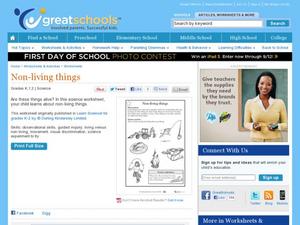Curated OER
Behind the Camera
Scholars, in groups, gather information relating to community health care. Using video and digital cameras, they interview members of a health center staff. They then compile digital images, select music, and narrate a story about their...
Curated OER
Multiplication: 2 Digit
For this multiplication review worksheet, pupils use their math skills to solve 20 problems that require them to multiply two-digit numbers by two-digit numbers.
Curated OER
Multiplication: 2 Digit, #2
Elementary schoolers use their math skills to solve 20 problems that require them to multiply two-digit numbers by two-digit numbers.
Curated OER
Dear Peter Rabbit
Write dear old Peter Rabbit a letter with this lesson. First, youngsters listen to the story Peter Rabbit and analyze the story elements. Then they complete a story map graphic organizer in order to write a letter to Peter...
Curated OER
The World Around Me
Combining visual and language arts, here is a resource that prompts middle schoolers to write stories based on pictures of their surroundings. They use digital cameras to take pictures of favorite areas in the school. Next, they choose...
Curated OER
Vocabulary Building Through Visualization of Word Meanings to Create Digital Art
Use online dictionaries to define vocabulary words and create a visualization of word meanings through digital art. Middle schoolers go online to define assigned vocabulary words. They visualize the meanings of the words in photo...
Curated OER
Real World Equations!
Help your math class "get the picture" in a quadratic equation lesson that integrates digital photography. Individuals take pictures to help them model the shape of an item or situation using algebraic equations. They discover how to...
Digital Wish
I See Lots of People
A straightforward digital photography lesson that is a practice in cloning. Learners take a photograph of an individual and then a group of classmates. They insert the individual several times in the picture to make it look like several...
Curated OER
Who Owns Water
Learners role play how water is allocated to different holders of water rights. In this ecology lesson, students identify the different water rights available. They explore problems associated with water use including drought, degraded...
Brethren High School
Romanticism Through the Eyes of Art, Poetry, and Technology
Use this simple collaborative activity to introduce the definition, art, and poetry of romanticism. Educators will have to provide the poetry, images of the art, and the survey for the learners, but by using this resource, they won't...
Curated OER
April Fools Web Quest
How much does your class know about the history of April Fools Day? They'll use the Internet and five great questions to uncover the history and origin of this very silly holiday. Two web links are included, to make hunting for answers...
Curated OER
Guardian Ad Litem & Child Intermediary
Students research and answer questions about a guardian ad litem. They are to create situations in which a guardian ad litem or child intermediary would be used.
Curated OER
Cemetery Restoration Project
Who is buried in this tomb? Trek to a local cemetery, take pictures of markers, explore records, and conduct interviews to bring to life the stories behind the stones. Use Olympus and Tool Factory to coordinate and gather information...
Curated OER
More, Less or Equal?
Your class compares groups of small stars by counting quantities in each of two sets and deciding which has more. They write symbols for greater than, less than, or equal to in a circle between each pair of sets. Two completed samples...
Curated OER
Complete the Fact Family - Multiplication and Division
Learners use their math skills to fill in the blanks in in 10 problems in order to solve the multiplication and division fact families.
Curated OER
From Photo to Printed Word: Getting Second-Graders to Write
Use photographs to entice your children to write! In this digital storytelling lesson, students study the functions of digital cameras. They review their sentence-writing skills, then take digital photos and write sentences that describe...
Curated OER
Latin Roots Dict, Vent, Duct: Beginning Quiz
Learners fill in the blanks for 12 sentences with words derived from the Latin roots dict, vent, and duct in an interactive online quiz. A word bank provides choices from the beginning level at MyVocabulary.com. Alert quiz takers that...
Curated OER
Boiling Point Elevation Problems
A table of the ebullioscopic constants for several compounds is found at the top of the worksheet. Using these constants, boiling point elevation can be calculated for the combinations of compounds. This worksheet has the answers along...
Curated OER
Food for thought
Cake has to be good for something, right? Different foods are used by our bodies in different ways. Learners will first read about what fats, proteins, fruits, and vegetables do for the human body. They will then put each of food shown...
Curated OER
Magnets are forceful
You could use this worksheet two different ways. As is, or you could have learners actually do the experiment shown. They are to determine which magnet is strongest by counting the number of paper clips hanging from it. Why not get five...
Curated OER
Non-living Things
Very young scientists circle the things on the worksheet that they think are living things. Most of the pictures are of non-living things. A handy worksheet to use during any initial discussion about living vs. non-living things.
Curated OER
Basic Subtraction Fact Worksheets to 20
Print this worksheet and have your helper pass it out. The class can use it to practice subtracting single and double-digit numbers up to 20. Some borrowing is required.
Curated OER
Searching the Internet for Information
For this searching the Internet worksheet, young scholars solve and complete 20 various short answer questions related to the Internet. First, they find information on the Internet and communicate that information to others via email....
Biology Junction
Cell Cycle and Mitosis
Deepen understanding of cell division with this resource. Young scientists read short paragraphs about the different stages of the cell cycle and use this information to answer a series of basic short answer questions and label several...
